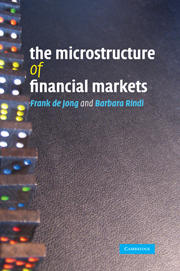Book contents
- Frontmatter
- Contents
- List of figures
- List of tables
- Preface
- Introduction
- 1 Institutions and market structure
- 2 Financial market equilibrium
- 3 Batch markets with strategic informed traders
- 4 Dealer markets: information-based models
- 5 Inventory models
- 6 Empirical models of market microstructure
- 7 Liquidity and asset pricing
- 8 Models of the limit order book
- 9 Price discovery
- 10 Policy issues in financial market structure
- Index
7 - Liquidity and asset pricing
Published online by Cambridge University Press: 05 June 2012
- Frontmatter
- Contents
- List of figures
- List of tables
- Preface
- Introduction
- 1 Institutions and market structure
- 2 Financial market equilibrium
- 3 Batch markets with strategic informed traders
- 4 Dealer markets: information-based models
- 5 Inventory models
- 6 Empirical models of market microstructure
- 7 Liquidity and asset pricing
- 8 Models of the limit order book
- 9 Price discovery
- 10 Policy issues in financial market structure
- Index
Summary
The core of this book consists of models of price formation that emphasize the role of transaction costs in financial markets. This chapter discusses the relationship between transaction costs and asset prices. The crucial question is whether transaction costs affect the price of the financial assets. Clearly, transaction costs are a measure of the degree of liquidity, and accordingly the purpose of this chapter is to show how asset prices and liquidity can be related. In the first section we build on the seminal work of Amihud and Mendelson (1986) and discuss models that relate the price of a stock to the level of liquidity. In the second section, we discuss the relationship between expected returns and liquidity risk.
Transaction costs and expected returns
From the investor's point of view, transaction costs reduce the return on investments, so rational investors will require a compensation for expected transaction costs. This affects the price an investor is willing to pay for an asset. As a result, in equilibrium, transaction costs lead to lower asset prices and therefore to higher expected returns gross of costs. Let's start with a simple example. Suppose an investor buys a stock for $100 (ask price) and holds it for one year. Suppose that after a year the ask price is $104, and the bid price is $102 (hence, the bid–ask spread is $2). To liquidate his position, the investor sells the asset at the bid price i.e. at $102.
Information
- Type
- Chapter
- Information
- The Microstructure of Financial Markets , pp. 116 - 126Publisher: Cambridge University PressPrint publication year: 2009
